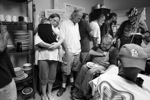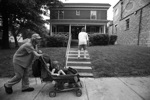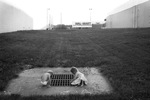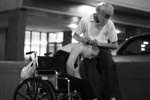Looking for a Way Home
At 22, Michele Silvey has already lived an exceptionally precarious life.
She says her mother was a mentally retarded alcoholic and drug addict who suffered from epilepsy. She was in and out of foster care from age 5 and was molested by her stepfather from age 10. She has been in 16 different psychiatric wards, taken 32 different medications, lived in four different group homes and, at one point, was transferred to a juvenile boot camp for being uncontrollable. While she managed to steer clear of drugs, she did spend time in jail and juvenile homes for assault and theft.
“I never had somewhere to feel comfortable and was always on the run,” Michele says. “I never had the structured family—the actual love, care, and devotion that I’m trying to give my children.”
Michele first met Charlie when they were both children in the foster care system. He had already dropped out of school when they reunited in Columbia, Missouri, and established a relationship. They were married at the Boone County Courthouse on July 25, 2003. Charlie was 17, Michele barely 18.
Not long after they were married, Michele learned she was pregnant. Ka’Mel was born August 11, 2004, with severe neurological problems, including epilepsy marked by intense grand mal seizures.
Doctors said she probably wouldn’t live past 2. Ka’Mel is now 3 but has the brain development level of a 1-year-old. She has trouble communicating, has behavioral problems, and requires frequent hospitalization.
The Silveys had their second child, Derek, on April 7, 2006. Their lives were relatively stable until last spring when the roof of the mobile home they had been living in for more than two years collapsed after a severe storm.
Michele has received help from nearly every social service agency in town, as well as churches and individuals. She and her children receive health care through the Medicaid program, which covers prenatal care and regular checkups. Michele also receives $342 a month through the federal Temporary Assistance for Needy Families program, which has a five-year lifetime cap.
The most difficult challenge for the Silveys has been finding safe, clean, affordable housing. Most shelters are reluctant to take in people with serious medical problems, and because Ka’Mel’s epilepsy is so severe and Michele suffers from seizures as well, even temporary housing is difficult to find.
Meanwhile, the Columbia Housing Authority has a long waiting list, and although Michele applied for a subsidized apartment in May 2007 she was told in September she’ll have to wait another nine months.
So many factors have converged—Ka’Mel’s health needs, the couple’s lack of credit and job skills, and Charlie’s criminal record—that finding a stable home at this point is an almost insurmountable task.
“Chronic homelessness is a story with no beginning, middle, and end,” says Colleen Coble, executive director of the Missouri Coalition Against Domestic Violence, “just chapter after chapter of instability.”












